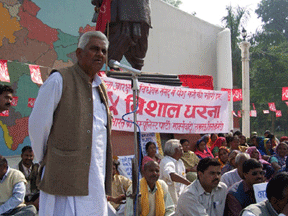 People's Democracy
People's Democracy
(Weekly
Organ of the Communist Party of India (Marxist)
No. 48
November 27, 2005
(Weekly
Organ of the Communist Party of India (Marxist)
|
Vol.
XXIX
No. 48 November 27, 2005 |
MASS DHARNAS ACROSS COUNTRY
Introduce & Pass Women’s Reservation Bill
In This Session Itself

CPI(M) leader addressing a dharna in Lucknow
AMIDST thunderous cheers, an impressive dharna at Jantar Mantar near Parliament House, was informed that the CPI(M) was committed to support the Women’s Reservation Bill in its original form and will continue its struggle for it, both inside and outside parliament. "We once again reiterate our demand that the UPA government introduce the 33 per cent women’s reservation bill in the winter session of parliament and get it passed", speaker after speaker said cautioning against any dilly dallying.
It was a mass dharna with hundreds of activists of CPI(M), Delhi state committee staging protest along with colleagues from the AIDWA, and the crowds represented a broad mix to sound the bugle on the eve of the parliament session. The signal was clear: Bring the bill or face the music.
The meeting was further told that a mass mobilisation on the dowry issue would begin this winter. The dharna was addressed among others by Sudha Sundararaman, general secretary AIDWA, Jogender Sharma, CPI(M) central committee member and P M S Grewal, Delhi Party state secretary . Baldev Singh, CPI(M) state secretariat member, presided over the dharna.
The speakers accused the UPA government of betraying the promise made in the CMP to introduce the Women’s Reservation Bill in its original form and get it passed in parliament. The argument given by the home minister in the last session of parliament that a consensus is necessary before introduction of such a legislation, is not tenable. Precisely the same argument had been advanced by the erstwhile NDA government to sabotage the bill. They also rejected proposals like increasing seats in Lok Sabha by one-third or those for reducing percentage of proposed reservation.
The speakers pointed out that the election manifestos of the Congress, BJP and Left parties for the 2004 Lok Sabha polls had expressed unequivocal support to the original legislation. The combined strength of these parties represents a comfortable majority in the Lok Sabha. The Congress thus has no excuse for not introducing the bill in its original form.